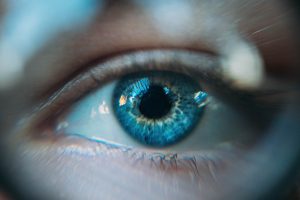Age-Related Macular Degeneration
What is Age-related Macular Degeneration (AMD)?

Age-related Macular Degeneration is the leading cause of vision loss in Americans aged 50 and over. The macula is located at the back of the retina and controls our central and color vision. Vision impairment from AMD occurs in one of two ways. In dry AMD, protein called drusin gather under the macula and begin to deteriorate the retinal support system. Once the structural support system of the retina has been broken down, it moves into wet AMD. The breaking down of that support allows abnormal blood vessels to grow and potentially leak into the retina, causing a loss of central vision.
Symptoms and Risk Factors of AMD
There are no real symptoms for age-related macular degeneration or low vision until the condition has progressed. Only an examination by your eye doctor can reveal indications before they become a problem. That is why it is so imperative that you get regular eye exams. After the age of 60, schedule exams for every year or as recommended by your doctor. Once the problem is identified, there are measures to take to slow or repair the damage to your vision.

Once you have AMD, you may see a dark spot in the middle of your vision. Lines or outlines of objects will also appear distorted or blurred. Colors may also appear different or faded.
Risk factors include but are not limited to:
- Genetics
- History of smoking
- Being female
- UV Light
- Age (50+)
AMD Treatment Options
The best treatment is always preventative measures. Scheduling regular eye exams will enable your doctor to recognize any issues before they progress. Catching AMD in the early stages leads to treatment by vitamin supplementation. Vitamins C, E, Beta Carotene, Zinc Oxide and Cupric Oxide have been shown to decrease the progression of Macular Degeneration when taken in the early stages.

If you are a smoker and show signs of AMD, the first step is to quit smoking. Then use caution when treating with vitamins since too much beta carotene in smokers has proven to increase the risk for lung cancer.
A healthy diet full of leafy green vegetables is also recommended for treatment.
The treatment for advanced stages of AMD is rapidly developing. There are various treatments that can be recommended by your doctor that focus on slowing the growth of blood vessels. These efforts can put a halt on any additional vision loss.
For additional information and resources on treatments and risk factors, visit our National Wellness Calendar. We’ll observe Age-Related Macular Degeneration Awareness Month this February 2020.

